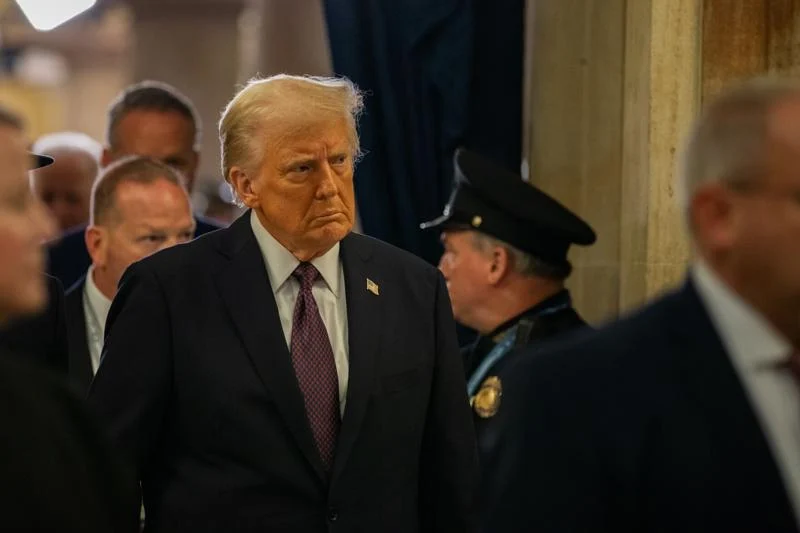President Donald Trump’s team of Department of Justice attorneys plans to take their tariff case to the U.S. Supreme Court if a federal appeals court doesn’t rule in their favor.
DOJ attorneys argued in a new brief that the Court of International Trade erred in ruling that the president doesn’t have unilateral authority to impose tariffs on U.S. trading partners around the world. They argued that if the CIT decision was upheld, it would disadvantage the U.S. as Trump seeks to reorder global trade through tariffs to put America at the center.
“The CIT’s injunction would, if affirmed, disrupt the Executive Branch’s ongoing, sensitive diplomatic negotiations with virtually every major trading partner,” attorneys for the administration wrote. “And it would unilaterally deprive the United States of a powerful tool for combating systemic distortions in the global trading system, thus allowing other nations to continue to hold American exporters hostage to their unreasonable, discriminatory, and sometimes retaliatory trade policies.”
They added: “If the Court affirms the judgment, we respectfully ask that the Court extend its stay … to allow the government to seek relief from the Supreme Court.”
Trump has turned to the nation’s highest court multiple times this term after federal judges blocked large parts of his domestic agenda.
The administration appealed after a three-judge panel of the U.S. Court of International Trade unanimously ruled in May that Congress did not give the president tariff authority under the International Emergency Economic Powers Act of 1977. The Court of International Trade gave Trump 10 days to unwind all the tariffs he issued under IEEPA. The federal appeals court granted the administration’s request for a stay, putting the Court of International Trade ruling on hold while the appeal continues.
Trump’s attorneys said presidents have used IEEPA authorities multiple times over the years. They pointed to President Jimmy Carter, who invoked the IEEPA to seize Iranian assets in response to the hostage crisis at the American Embassy in Tehran. President Ronald Reagan issued executive orders “banning commerce with Libya and freezing all U.S. assets of the Libyan government and its agents.” President Bill Clinton “blocked Russian assets related to the implementation of an agreement for the disposition of highly enriched uranium extracted from nuclear weapons.” President George W. Bush used IEEPA to “maintain the export control system previously established under a different statute. Biden also used the IEEPA. But none of those presidents used the IEEPA they way Trump has: To issue worldwide tariffs on nearly every U.S. trading partner.
The administration’s attorneys said the tariffs have been good for the U.S.
“And the tariffs have already achieved successes,” they wrote “They have spurred ongoing negotiations on trade agreements with major trading partners and have already produced the general terms of a historic trade deal with the United Kingdom.”
Small businesses and some states disagree. States and small businesses challenged the “Liberation Day” tariffs in two separate cases that are on appeal before the Federal Circuit Court of Appeals.
The businesses, represented by the Liberty Justice Center, said their livelihood is on the line. The businesses included VOS Selections, a New York-based wine and spirit importer, along with others business owners, including one who expects to go out of business before the case reaches a conclusion.
On Wednesday, Liberty Justice Center added to its roster of attorneys in the high-profile case. LJC added constitutional scholars Michael McConnell and Neal Katyal and their law firms to the suit.
“More than any other case challenging executive action, the tariff cases combine fundamental principles of structural constitutional law with immense consequences for the economy,” McConnell said.
The plaintiffs argue that the IEEPA does not authorize the president to impose tariffs at all. And even if it did, it would still require an economic emergency and an unusual, extraordinary threat to be invoked. Existing circumstances don’t meet those requirements, LJC attorneys have argued.
The U.S Court of Appeals for the Federal Circuit will hold a hearing in the case on July 31, which will be available via livestream.
Economists, businesses and some publicly traded companies have warned that tariffs could raise prices on a wide range of consumer products.
Trump has said he wants to use tariffs to restore manufacturing jobs lost to lower-wage countries in decades past, shift the tax burden away from U.S. families, and pay down the national debt.






